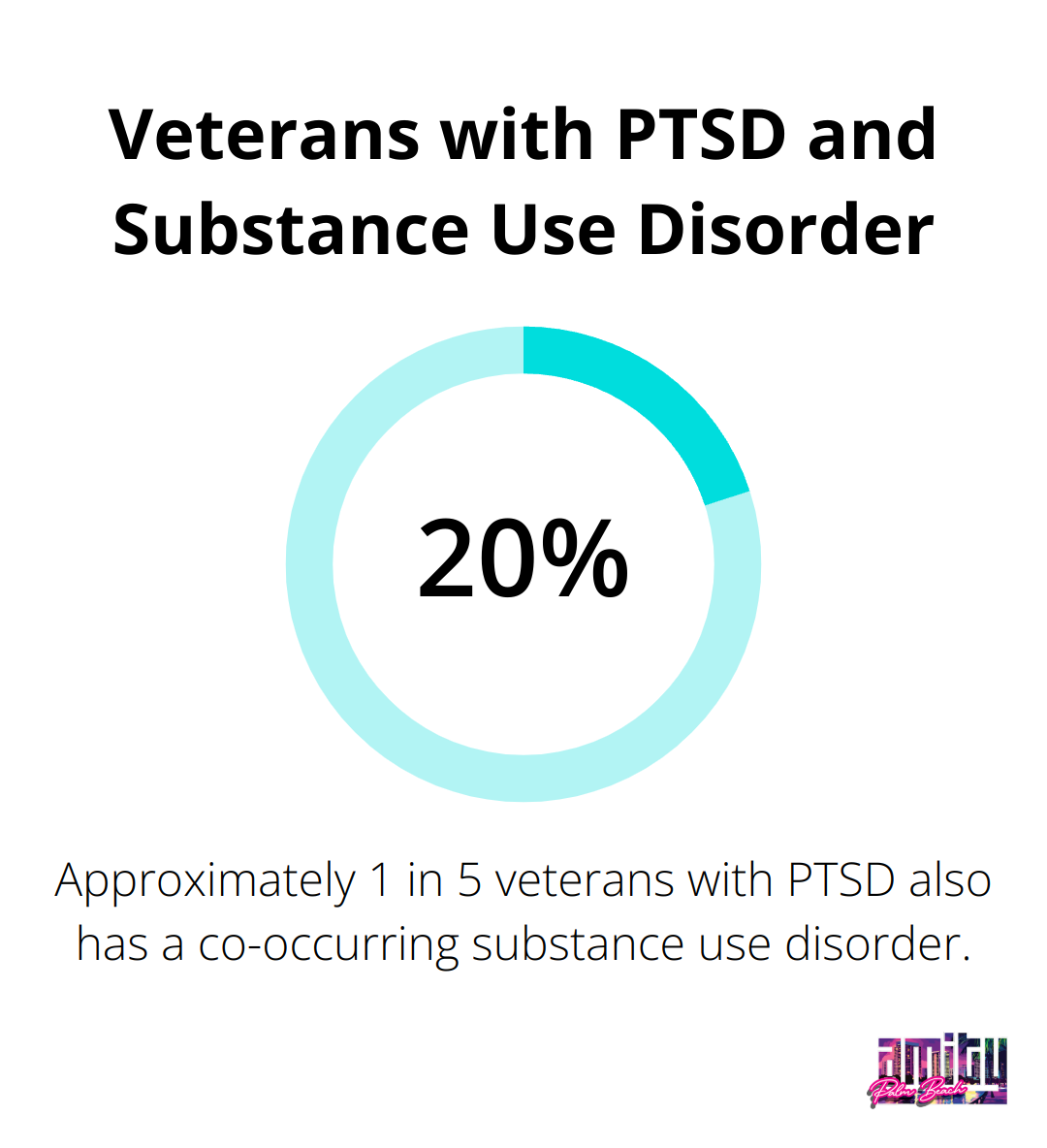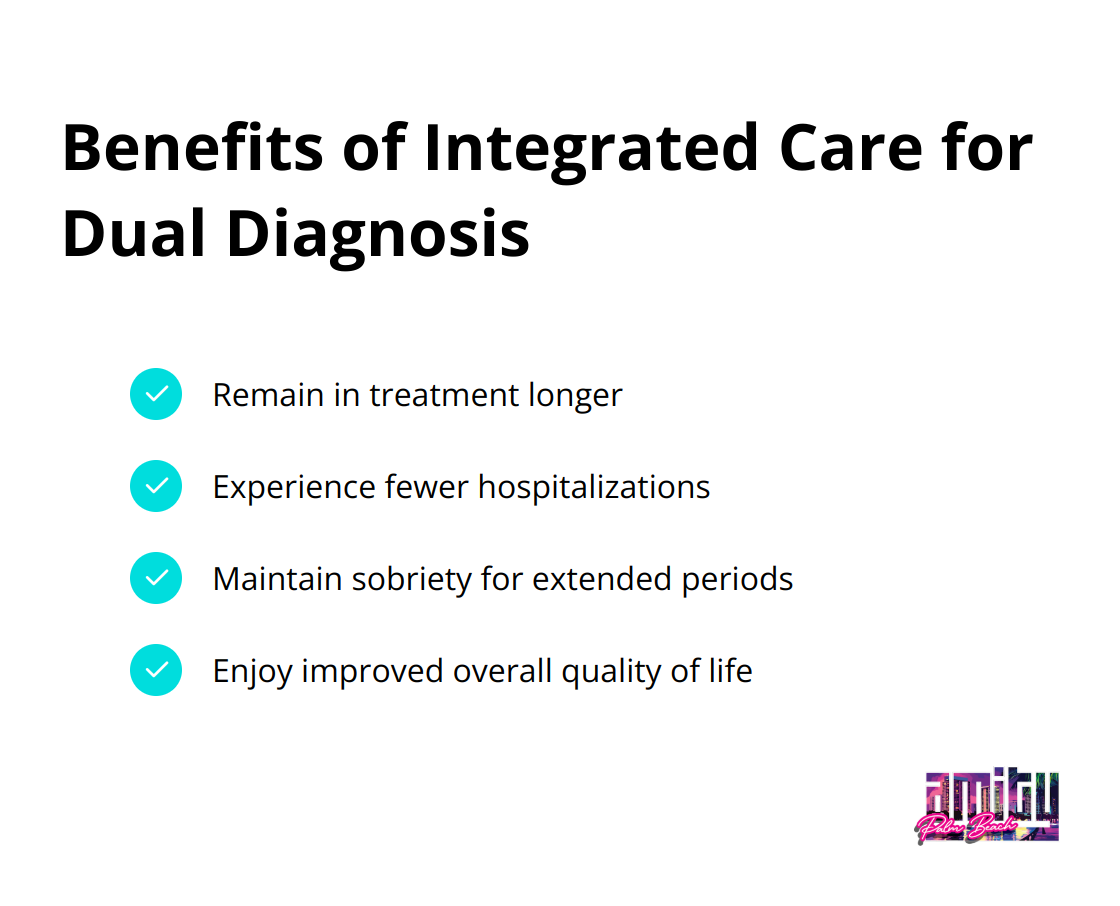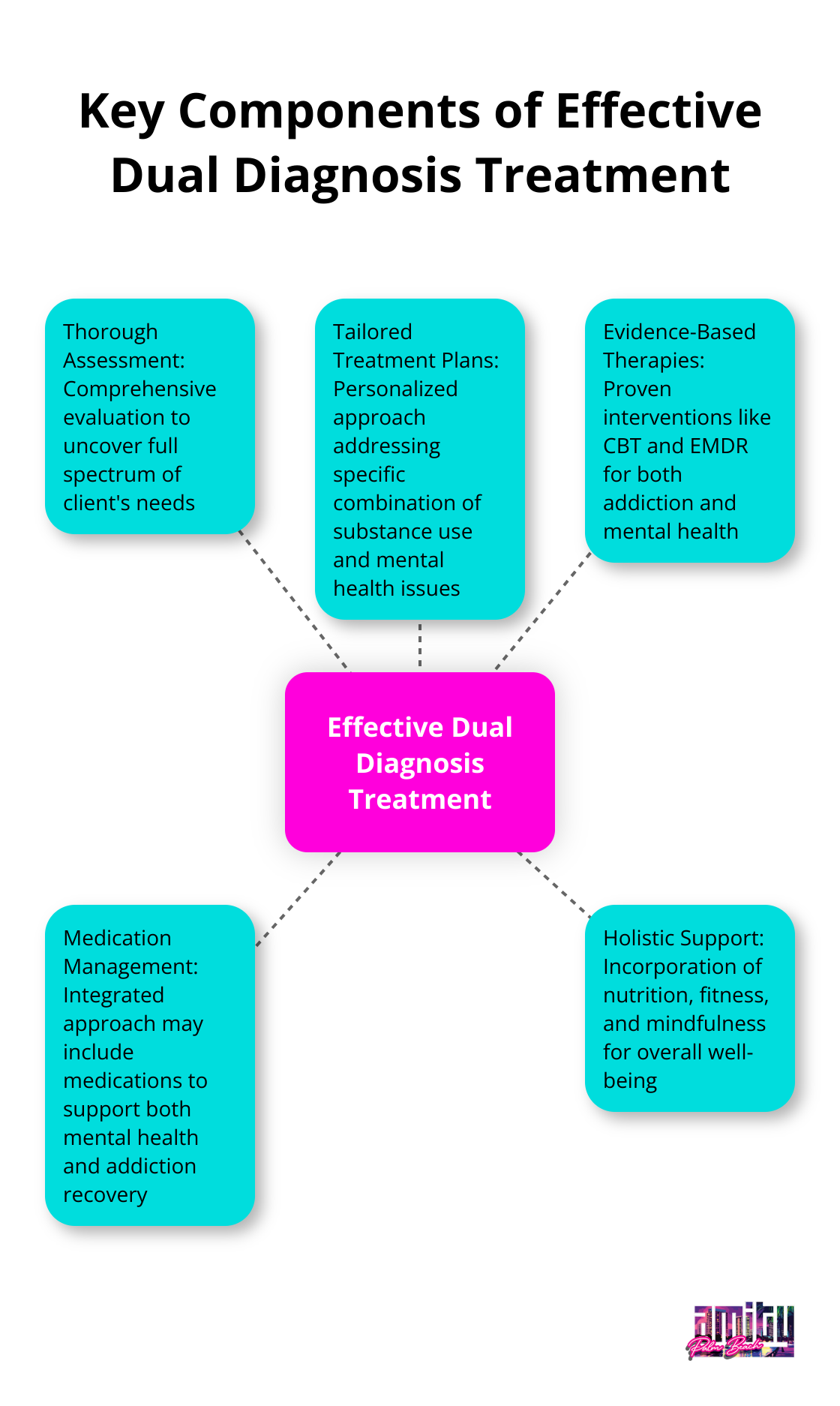At Amity Palm Beach, we understand the complexity of dual diagnosis and its impact on recovery.
Dual diagnosis, the co-occurrence of addiction and mental health disorders, presents unique challenges in treatment.
We recognize that addressing both conditions simultaneously is crucial for achieving lasting recovery and improved overall well-being.
What is Dual Diagnosis?
The Complexity of Co-occurring Disorders
Dual diagnosis represents a complex condition that affects millions of individuals seeking addiction treatment. At Amity Palm Beach, we witness the prevalence of this issue among our clients firsthand.
The Interplay of Addiction and Mental Health
Dual diagnosis occurs when a person experiences both a substance use disorder and a mental health condition simultaneously. These co-occurring disorders can include depression, anxiety, bipolar disorder, or post-traumatic stress disorder (PTSD) alongside addiction to alcohol, opioids, or other substances.
Prevalence in Treatment Settings
Dual diagnosis often leads to more severe symptoms, poorer treatment outcomes, increased risk of relapse, and higher rates of hospitalization. This high rate of co-occurrence underscores the importance of integrated treatment approaches.
Challenges in Diagnosis and Treatment
Identifying dual diagnosis presents significant challenges. Symptoms often overlap, and substance use can mask or exacerbate mental health symptoms. For example, cocaine use might mimic symptoms of mania, while alcohol abuse can worsen depression.
Our intake process includes comprehensive assessments to uncover any co-occurring disorders. We use evidence-based screening tools and in-depth interviews to get a full picture of each client’s needs.
The Impact on Recovery
Untreated mental health issues significantly hinder addiction recovery efforts. Conversely, continued substance use worsens mental health symptoms. This cyclical relationship makes it essential to address both conditions concurrently for the best chance at long-term recovery.
Our integrated treatment approach targets both the addiction and mental health aspects, providing clients with the tools they need to manage both conditions effectively. This holistic strategy (which combines medical, psychological, and lifestyle interventions) forms the foundation for sustainable recovery and improved overall well-being.
As we explore the importance of integrated treatment in the next section, you’ll discover why addressing addiction and mental health simultaneously leads to better outcomes and a more comprehensive healing process.
Why Integrated Treatment Matters
Breaking the Cycle of Separate Treatment
At Amity Palm Beach, we witness the transformative power of integrated treatment daily. This approach tackles both addiction and mental health issues simultaneously, which leads to better outcomes and long-lasting recovery.
Treating addiction and mental health disorders separately often results in a frustrating cycle of partial recovery and relapse. Approximately 1 in 5 veterans with PTSD also has a co-occurring substance use disorder. When only one issue receives attention, the untreated condition can trigger a relapse in the other.

Synergistic Healing
Integrated treatment creates a synergistic effect. We help clients develop comprehensive coping strategies by addressing both conditions at once. For example, a client with depression and alcohol use disorder learns to manage depressive symptoms without alcohol, while also addressing the underlying issues that fuel their addiction treatment.
Improved Long-Term Outcomes
Research published in the Journal of Substance Abuse Treatment demonstrates that integrated treatment significantly improves outcomes. Clients who receive integrated care are more likely to:
- Remain in treatment longer
- Experience fewer hospitalizations
- Maintain sobriety for extended periods
- Enjoy improved overall quality of life

Unified Treatment Plans
A unified treatment plan ensures that all aspects of a client’s health receive consideration. This holistic view allows us to tailor interventions that work in harmony, rather than potentially conflicting separate treatments.
Reducing Stigma
Integrated care helps reduce the stigma associated with both mental health and addiction. The treatment of these conditions together reinforces the understanding that both are medical issues deserving of compassionate, evidence-based care.
As we move forward, we’ll explore the key components that make dual diagnosis treatment effective. These elements work together to create a comprehensive approach that addresses the unique needs of individuals struggling with co-occurring disorders.
What Makes Dual Diagnosis Treatment Effective?
At Amity Palm Beach, we’ve observed how the right approach to dual diagnosis treatment transforms lives. Our experience aligns with research from the National Institute on Drug Abuse, which shows that integrated treatment for co-occurring disorders leads to better outcomes. Here’s what we’ve found to be essential in effective dual diagnosis care:

Thorough Assessment
The foundation of successful treatment lies in accurate diagnosis. We use a combination of clinical interviews, standardized assessments, and medical evaluations to uncover the full spectrum of a client’s needs. This process often reveals underlying issues that clients themselves may not have recognized. For instance, we’ve had clients seek alcohol addiction treatment only to discover they also struggle with undiagnosed PTSD.
Tailored Treatment Plans
One-size-fits-all approaches don’t work for dual diagnosis. Each client receives a personalized treatment plan that addresses their specific combination of substance use and mental health issues. This might include a mix of individual therapy, group sessions, and targeted interventions for each condition.
Evidence-Based Therapies
We rely on therapies proven effective for both addiction and mental health disorders. Cognitive Behavioral Therapy (CBT) is a cornerstone of our approach, helping clients identify and change harmful thought patterns. For trauma-related disorders, we often incorporate Eye Movement Desensitization and Reprocessing (EMDR). These therapies work in tandem to address the complex interplay between addiction treatment and mental health.
Medication Management
An integrated treatment approach is the most effective strategy for dealing with dual diagnosis. This means that both disorders are treated simultaneously, which may include the use of medications to support both mental health and addiction recovery.
Holistic Support
Recovery isn’t just about addressing symptoms; it’s about building a fulfilling life. We incorporate holistic approaches like nutrition counseling, fitness programs, and mindfulness training. These elements support overall well-being and provide clients with tools to manage stress and emotions without turning to substances.
Final Thoughts
Dual diagnosis treatment marks a significant step forward in addiction recovery. At Amity Palm Beach, we observe how addressing substance use and mental health disorders together results in more effective, enduring healing. This integrated approach stops the cycle of incomplete recovery and relapse that often affects those with co-occurring conditions.
The intricacy of dual diagnosis requires specialized care. Our team employs evidence-based therapies, customized treatment plans, and comprehensive support to address our clients’ full range of needs. We combine medical expertise with compassionate care to provide the necessary tools and support for long-term recovery.
If you or someone you care about struggles with co-occurring disorders, professional help is essential for recovery. Amity Palm Beach offers expert dual diagnosis treatment in a supportive environment. Don’t wait to seek the specialized care you deserve; your path to healing and empowerment begins with comprehensive, integrated treatment.




